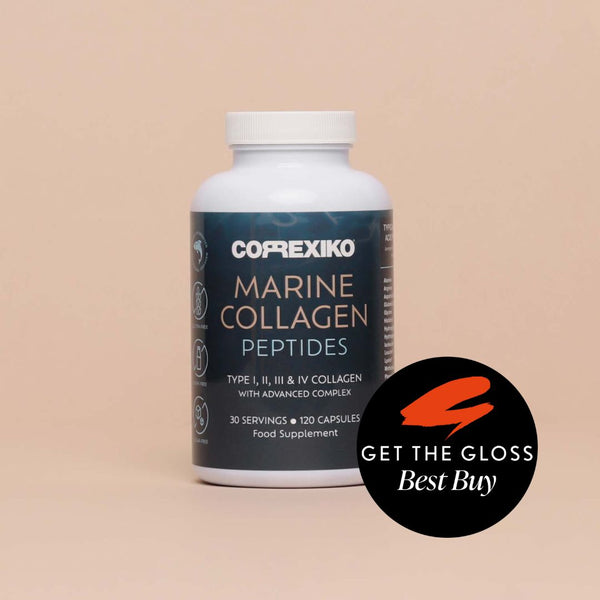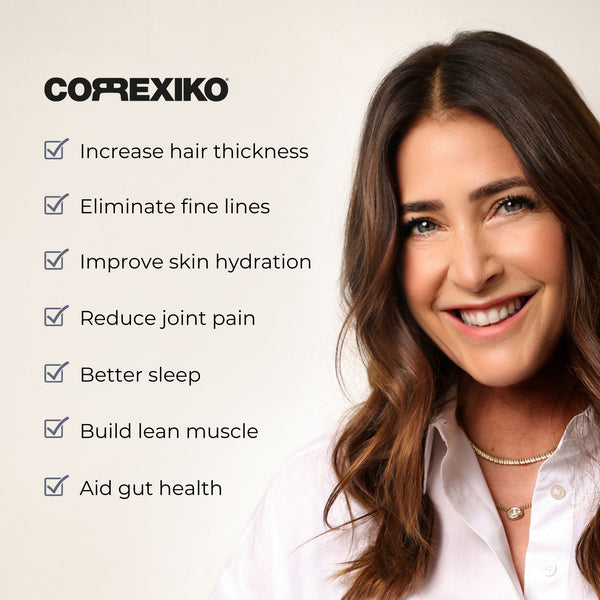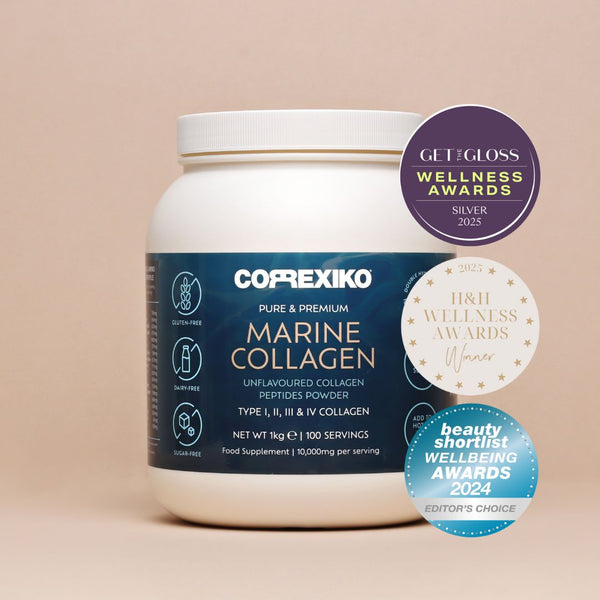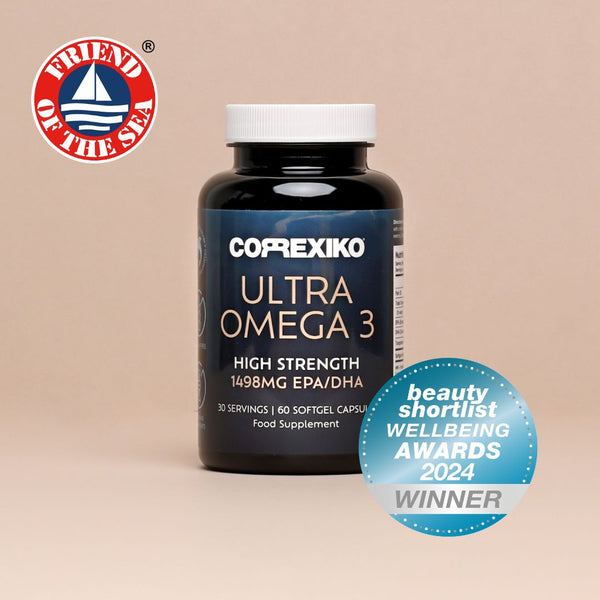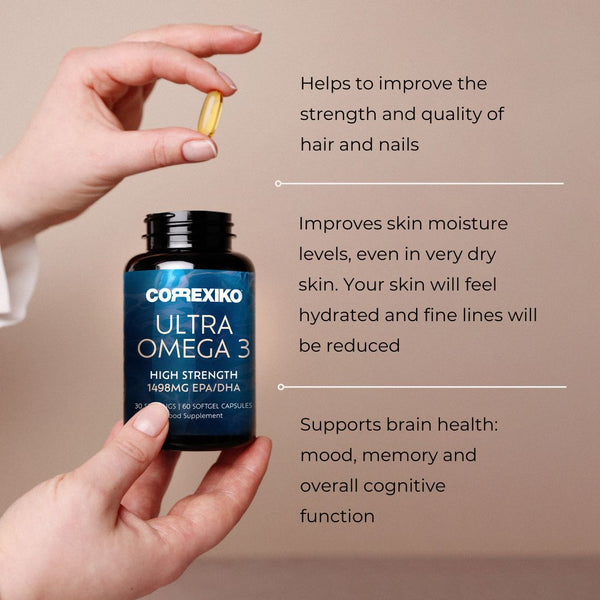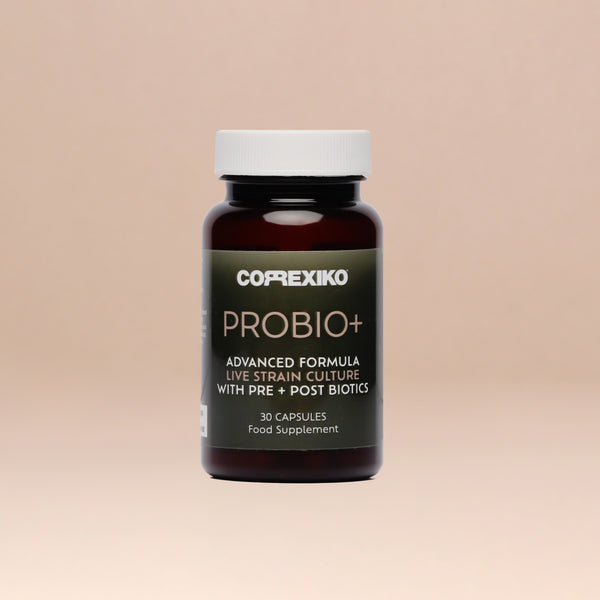If you've ever wondered about the secret to youthful skin, strong nails, and healthy hair, the answer lies in a protein called collagen. It's the body's most abundant protein and plays a crucial role in maintaining skin elasticity, joint health, and more.
As we age, our body's collagen production naturally slows down, which is why it’s important to boost production through our diet. This includes consuming bone broth and Vitamin C-rich foods that support collagen synthesis, as well as supplements like marine collagen capsules or powder.
Let’s take a closer look at the food you can eat to boost collagen production.
How Does the Body Produce Collagen?
Collagen is a type of protein that our body constructs from specific amino acids. The process of generating this 'super protein' - called collagen synthesis - is a complex sequence that occurs within the body's cells.
This meticulous creation first requires the presence of a class of cells known as fibroblasts. Through absorbing collagen peptides - the smaller cousins of proteins, these cells play a pivotal role in constructing the collagen.
Afterwards, the body takes these complex proteins and sends them through an advanced process known as post-translational modification. This is where the real magic happens: the collagen enzymes, proline and lysine, are transformed into hydroxyproline and hydroxylysine, creating a triple helix structure.
This structure is then transported from the cells to form a strong and sturdy net, fortifying our skin, hair, nails, bones — almost everything. However, this process slows down as we age, which is why many turn to foods to increase their collagen intake.
Boosting collagen production is not just about applying topical creams or taking collagen capsules. It's also about making certain lifestyle changes and dietary adjustments. In this section, we will explore various ways to increase collagen production naturally. From the foods you eat to the habits you adopt, there are numerous strategies that can help your body make more collagen, including:
- Cut Sugar Intake: Higher sugar consumption has been linked with restricting collagen regeneration. Reducing sugar can help your body build more collagen.
- Hydrate: Water is essential for maintaining the overall health of the skin and aids in collagen production.
- Eat More Vitamin C: Citrus fruits, peppers, and strawberries are great sources of Vitamin C which helps your body make more collagen.
- Include Protein in Your Meals: Protein is packed with amino acids which are the foundation for collagen. Increase your collagen production by incorporating more lean meats and dairy.
Small lifestyle changes can make a significant difference to your body's ability to produce collagen.
The Role of Diet in Collagen Production
A well-balanced diet plays a critical role in collagen production. Including certain nutrients in your daily regimen can stimulate the body to build more collagen. The consumption of vitamin C, for instance, is scientifically proven to help your body make collagen efficiently.
Protein-rich foods like meat and dairy items also contribute to collagen synthesis. Not surprisingly, since collagen is primarily composed of the protein amino acids. Hence, facilitating their availability can foster the body's capacity to create this vital molecule.
You should also get your fair share of zinc-containing foods. This mineral serves as an essential catalyst in the collagen-making process. Don't overlook antioxidants, either. These body defenders are effective at counteracting the destructive processes which can adversely affect collagen levels. Including antioxidant-rich foods in your daily menu, then, is a smart move to increase your collagen production.
When to Consider Collagen Supplements
While it's possible to increase collagen production through a diet rich in amino acids, vitamins, and minerals, it becomes increasingly challenging for older individuals to solely rely on dietary sources. As we age, our body's natural collagen production slows down, making it difficult to compensate through diet alone.
If you're noticing signs of ageing skin, such as wrinkles or sagging, or experiencing joint pain, you might consider supplementing your diet with collagen. Here are some scenarios where collagen supplements can be beneficial:
- Ageing Skin: Collagen supplements can help improve skin elasticity, reduce wrinkles, and promote a youthful appearance.
- Joint Health: Collagen can support joint health by strengthening cartilage and reducing inflammation.
- Hair and Nail Health: Collagen can strengthen hair and nails, reducing breakage and promoting growth.
- Digestive Health: Collagen can support gut health by improving gut lining integrity.
Double hydrolyzed marine collagen supplements like Correxiko are a popular choice for several reasons:
- Enhanced Absorption: The hydrolysis process breaks down collagen into smaller peptides, making it easier for the body to absorb.
- Pure and Potent: Marine collagen is sourced from fish, providing a clean and potent source of collagen.
- Environmental Friendliness: Marine collagen is often sourced sustainably, reducing its environmental impact.
By incorporating a high-quality collagen supplement into your daily routine, you can support your body's natural collagen production and enjoy the benefits of youthful, healthy skin and joints.
Foods That Can Help Boost Collagen Production
From animal foods high in collagen to plant-based foods that promote collagen synthesis, there's a wide array of food sources to choose from. Incorporating these into your diet can help replenish your body's collagen reserves, promoting skin health and overall wellbeing, including:
Animal Sources High in Collagen
When it comes to sourcing foods that can help boost collagen, animal foods and seafood are among the top tier. These collagen-rich sources serve as foundational blocks necessary for maintaining skin health.
- Bone Broth: Rich in collagen, bone broth has been considered a traditional health drink in many cultures due to its nutrient richness. With consistent consumption, it can effectively support collagen production.
- Chicken: The ubiquitous chicken, specifically its skin and cartilage, is high in collagen. This makes it an excellent choice for boosting your skin health and overall wellbeing.
- Fish and Shellfish: These members of the aquatic world are not only tasty but also a great source of collagen. Their skin, although often overlooked, packs a potent collagen punch.
- Eggs: The whites of eggs contain large amounts of proline, an amino acid that is crucial in collagen synthesis.
Whether you're a meat lover or a seafood enthusiast, these foods offer a collagen-filled food source that can help your body replenish its collagen reserves. Remember, consuming a balanced mix from various food groups ensures a holistic approach in collagen generation.
Plant-Based Foods That Promote Collagen Synthesis
While carnivorous collagen-seekers may rely on animal foods and seafood, vegetarians and vegans need not be disheartened. There are plenty of plant-based sources that can help bolster your collagen production.
- Soy Products: Soy contains genistein, a plant hormone that's been shown to increase collagen & protects against enzymes that tend to break it down.
- Berries: Berries are high in vitamin C, which is essential for collagen synthesis. They are a delightful food source for collagen reinforcement.
- Leafy Greens: Greens like spinach and kale are rich in chlorophyll, which has been associated with increased collagen production.
- Beans: Not only are beans high in protein, but they also contain amino acids essential for collagen synthesis.
- Garlic: Garlic contains taurine and lipoic acid, which help rebuild damaged collagen.
These plant-based foods are fantastic sources of nutrients that support collagen synthesis and can fit beautifully into any diet to promote overall health and vitality.
The Role of Bone Broth in Collagen Production
Bone broth, whether made with beef or pork bones, brims with collagen. This potent brew's nutrient-rich profile is a result of slow cooking animal bones over extended periods, which induces collagen and various other beneficial nutrients to break down and seep into the broth.
Not only does bone broth serve as an excellent source of collagen, but it's also high in vitamins, notably Vitamin C, which is essential for collagen synthesis in the body. Consuming foods high in Vitamin C can significantly aid collagen absorption, which is why bone broth is such an effective booster.
To top it off, the versatility of bone broth makes for wide-ranging dietary applications. From being a base for soups and stews to being drunk in its pure form, incorporating beef or pork bone broth into your daily routine can provide an efficient route towards more abundant collagen production. With so many perks in its favour, the collagen-boosting potential of bone broth is beyond question.
Bone broth can be consumed straight up, for a collagen-boosting drink. Alternatively, you can incorporate it into a variety of dishes; it serves as a great base for soups, sauces and can be used as a cooking liquid for grains.
The Impact of Vitamin C on Collagen Production
Vitamin C, also known as ascorbic acid, plays a pivotal role in collagen formation. As an enzyme co-factor, it catalyses the hydroxylation of proline and lysine in procollagen. This hydroxylation stabilises the collagen molecule, facilitating its secretion from the cells.
But what happens when there's a vitamin c deficiency? Unfortunately, a lack of this critical nutrient impairs collagen formation. This leads to symptoms related to weakened connective tissues, such as scurvy.
Importantly, vitamin c is also an antioxidant. It defends the skin from damage caused by free radicals, facilitating collagen preservation. Sun exposure, smoking, and pollution produce free radicals that degrade collagen and lead to premature ageing.
Interestingly, the body can't produce or store vitamin C. This makes it essential to continuously replenish our body's supplies through our diet. Therefore, it's vital to add vitamin c rich foods to your routine and ensure your body can make collagen effectively.
Incorporating green tea into your diet can also support collagen production. The antioxidants present in green tea combat free radicals, protecting collagen from damage.
You can also add Vitamin C-rich foods like:
- Citrus Fruits: Known to be abundant in Vitamin C, citrus fruits like oranges, grapefruits, and lemons are not only refreshing but a potent boost for your collagen production.
- Berries: Whether it's strawberries, raspberries, or blueberries, these juicy fruits are all high in vitamin C and should be added to your diet if you want your body to make collagen swiftly.
- Green Tea: While not traditionally seen as a source of Vitamin C, consuming green tea infused with lemon or other citrus fruit can help meet your Vitamin C needs and contribute to skin care.
- Green Vegetables: Too often overlooked, vegetables such as spinach, broccoli and bell peppers are extremely high in vitamin C. This aspect of their nutrition profile further elevates their status as superfoods.
- Salmon: Even though it's not the first food to come to mind when thinking of vitamin C, salmon deserves a mention due to its other nutritional benefits which enhance collagen production. Include this nutritious fish in your meals to ensure a well-rounded approach to boosting collagen.
Choose to add these foods high in Vitamin C to your diet, and you'll be augmenting your body's ability to enhance its collagen production effectively and naturally.
Final Thoughts on Boosting Collagen Production Through Diet
The foods we consume play a significant role in collagen production. Incorporating a diet high in collagen-rich foods like bone broth, organ meats, and animal skin can significantly boost your body's collagen synthesis. Don't forget the importance of vitamin C, which aids in collagen production, making it a crucial addition to your diet.
You can ensure that your body receives the age-busting power of collagen by adding a supplement like Correxiko to your diet. Developed by a medical doctor, Correxiko is double-hydrolyzed and sustainably made, ensuring that you see results faster. Find your favourite marine collagen supplement today!


